Sidney L. Buckwold
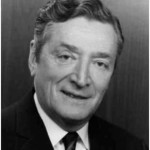
Sidney L. Buckwold was born on November 3, 1916 in Winnipeg, Manitoba. After having lived in Admiral, Saskatchewan, he moved to Saskatoon with his family in 1925.
Sidney attended Buena Vista School, Nutana Collegiate, and the University of Saskatchewan before obtaining a Bachelor of Arts in Commerce degree from McGill University in 1936. After graduation, Sidney joined the family business Buckwold’s Limited, a wholesale distributing firm.
From 1942 until 1945, Sidney served in the Canadian Army Service Corporation as an officer. After returning to Saskatoon, Sidney was elected to Saskatoon City Council in 1953. He became Mayor of Saskatoon in 1957 and held this position until 1963, when his campaign as a Liberal candidate was unsuccessful. In 1967, Sidney was re-elected Mayor of Saskatoon and he stayed in this position until 1971. From 1971 until 1991, Sidney occupied a position in the Canadian Senate. On May 20, 1982, Sidney received an Honourary Doctor of Laws degree from the University of Saskatchewan. He was appointed an Officer of the Order of Canada in 1995. Sidney passed away on June 27, 2001.
Buckwold Bay, Court, Crescent, Place, Rise, and Terrace in Arbour Creek are named in his honour. The Sid Buckwold Theater at the TCU Place is also named in Sidney’s honour. The Sidney Buckwold Park in College Park East remembers Sidney. The Senator Sidney L. Buckwold Bridge officially opened in 1966. The bridge was formerly known as the Idylwyld Freeway and was changed to the Sidney L. Buckwold Bridge in 2001.
Sidney formerly resided at 1138 Elliott Street.
This information was gathered from the following sources:
– Canadian Plains Research Center (n.d.). Buckwold, Sidney L. (1916-2001). In The
Encyclopedia of Saskatchewan. Retrieved from http://esask.uregina.ca/entry/buckwold_sidney_l_1916-2001.html
– City of Saskatoon (n.d.). Saskatoon: The City of Bridges. Retrieved from
http://www.saskatoon.ca/DEPARTMENTS/Infrastructure%20Services/Transportation/TransportationPlanning/Documents/city_of_bridges.pdf
– Henderson’s Saskatoon Directory, 1950.
Parliament of Canada (n.d.). Buckwold, The Hon. Sidney Labe O.C., B.Comm. LL.D.
(Hon.).Retrieved from http://www.parl.gc.ca/parlinfo/Files/Parliamentarian.aspx?Item=70ed7f49-b47a-4370-9c39-a8d557f8e4e6&Language=E&Section=ALL
– TCU Place (2014). Sid Buckwold Theatre. Retrieved from http://www.tcuplace.com/mobile/pages/about_sid_buckwold_theatre
– University of Saskatchewan, University Archives and Special Collections. Honourary
Degrees (http://library.usask.ca/archives/campus-history/honorary-degrees.php; accessed August 15, 2014).
Lillian Dyck
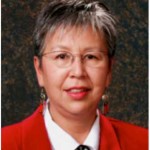
Lillian Dyck was born on August 24, 1945 in North Battleford, Saskatchewan. In 1968, Lillian earned her Bachelor of Arts (Honours) and in 1970, she earned a Master of Science degree, both from the University of Saskatchewan. In 1981, Lillian earned a PhD in Biological Psychiatry, also from the University of Saskatchewan.
Lillian’s career began in 1967, when she was an assistant in the University of Saskatchewan’s Biochemistry department. In 1981, Lillian became a neurochemist and professor in the Neuropsychiatry Research Unit at the University of Saskatchewan. Her research areas have included the impact upon neurotransmission of anti-depressants and anti-psychotics and alcohol metabolism in Saskatchewan First Nations and other races. While at the University of Saskatchewan, Lillian also served as Associate Dean of Graduate Studies.
Throughout her career, Lillian has been a strong advocate for the education and employment of women, Chinese Canadians, and Aboriginal peoples. In 2005, Lillian became the first female First Nations Senator and the first Canadian born Chinese Senator.
Lillian has received many honours throughout her career including the National Aboriginal Achievement Award for Science and Technology in 1999, a Saskatchewan First Nations Women of the Dawn Award for Science and Technology in 2000, and the YWCA Woman of Distinction Award for Science, Technology, and the Environment in 2003. Lillian is Vice-Chair of the Aboriginal Peoples Committee and a member of the Social Affairs, Science and Technology Committee of the Senate.
Lillian has been honoured by a play based on her life called Café Daughter. The film is by Cree playwright Kenneth T. Williams and first premiered in Whitehorse, Yukon in 2011.
Lillian currently resides in the Varsity View neighbourhood.
This information was gathered from the following sources:
– Coneghan, D. (n.d.). Dyck, Lillian Eva (1945-). In The Encyclopedia of Saskatchewan.
Retrieved from http://esask.uregina.ca/entry/dyck_lillian_eva_1945-.html
– Lillian Dyck (n.d.). Biography. Retrieved from http://sen.parl.gc.ca/ldyck/html/eng/03biography.html
– Wrightson, K. (2013). Lillian Dyck. In Women Suffrage and Beyond: Confronting the
Democratic Deficit. Retrieved from http://womensuffrage.org/?p=21354
James Wilfred Estey
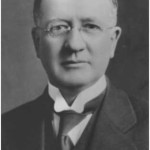
James Wilfred Estey was born on December 1, 1889 in Keswick, New Brunswick. James obtained a Bachelor of Arts degree at the University of New Brunswick in 1910 and then went on to Harvard, obtaining a Bachelor of Laws degree in 1915. James came to Saskatoon in that same year. From 1915 until 1925, he lectured in law at the University of Saskatchewan.
At the start of his law career, James articled with the firm McCraney, McKenzie, and Hutchinson. In 1917, he was admitted to the Saskatchewan Bar. He remained with McCraney, McKenzie, and Hutchinson until 1921. From 1921 until 1929, James was the Crown Prosecutor in the Saskatoon judicial district. From 1926 until 1934, James served as the Governor of the University of Saskatchewan.
In 1928, James decided to start a new firm. The firm was called Estey, Moxon, Schmitt, and McDonald and was located in the Grain Building on 21st Street. This specific partnership operated until 1948.
James began his political career in 1929, when he first ran for public office for the Liberal Party of Saskatchewan. However, he was defeated by J.W.T. Anderson. In 1934, James again contested the seat and won. From 1934 until 1941, he was the Minister of Education. In 1939, James was appointed Attorney General for Saskatchewan and served in this position until 1944. During this time, he drafted the Debt Adjustment Act to give protection to individuals who were being faced with seizure of property as a result of the Depression. In 1944, James was appointed to the Supreme Court of Canada. He remained in this position until 1956. He was the second Saskatchewan judge to be appointed to the Supreme Court.
In 1945, James received an Honourary Doctor of Laws degree from the University of New Brunswick, and in 1953, he received an Honourary Civil Laws degree from the University of Saskatchewan. James passed away on January 22, 1956 in Ottawa, Ontario. James’ son, Clarence Estey, followed in his father’s footsteps by becoming a Provincial Liberal Party member and a judge.
Estey Drive in Adelaide Park is named in his honour.
James formerly resided at 1032 Aird Street.
This information was gathered from the following sources:
– Duerkop, J. (2000). Saskatoon’s History in Street Names. Saskatoon: Purich Publishing
Ltd.
– Henderson’s Saskatoon Directory, 1925.
– Quiring, B. (Ed.)(2004). Saskatchewan Politicians: Lives Past and Present. Regina:
University of Regina Press.
– Quring, B. (n.d.). Estey, James Wilfred (1889-1956). In The Encyclopedia of
Saskatchewan. Retrieved from http://esask.uregina.ca/entry/estey_james_wilfred_1889-1956.html
– Robertson Stromberg (n.d.). The Honourable James Wilfred Estey (1889-1956).
Retrieved from http://www.rslaw.com/about-us/history/estey/
– Supreme Court of Canada (2009). The Honourable Mr. Justice James Wilfred Estey.
Retrieved from http://www.scc-csc.gc.ca/court-cour/judges-juges/bio-eng.aspx?id=james-wilfred-estey
Clarence Estey
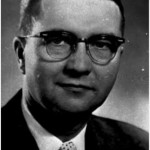
Clarence Estey was born on June 29, 1917 in Saskatoon, Saskatchewan. Growing up, Clarence attended Albert School, Victoria School, and Nutana Collegiate. In 1938, he received a Bachelor of Arts degree, and in 1940, he received a Bachelor of Laws degree, both from the University of Saskatchewan. In 1941, Clarence was called to the Saskatchewan Bar. In that same year, Clarence enlisted in the Canadian Army. However, after being wounded in 1944, Clarence was discharged and returned to Saskatoon.
Shortly after returning from the army, Clarence joined his father’s former law firm, Moxon and Schmitt, and remained there until 1967. Clarence was appointed Queen’s Counsel in 1956. In 1967, Clarence was elected to the Saskatchewan Legislature and served as a Liberal Party Member of the Legislative Assembly for the
Saskatoon Nutana Centre until 1971. Clarence also held many other positions during this time. From 1967 until 1970, he was the Minister of Municipal Affairs for the Ross Thatcher Government. From 1969 until 1970, Clarence was the Minister of the Saskatchewan Indian and Metis Department. From 1970 until 1971, he was the Minister of Industry and Commerce as well as the Minister Responsible for Saskatchewan Power Corporation.
After Clarence was defeated in the 1971 Provincial Election, he returned to law. In 1974, he was appointed as a justice of the Queen’s Bench and fulfilled this position until his retirement in 1992. Clarence passed away on March 5, 1995 in Saskatoon.
Clarence formerly resided at 1213 Elliott Street.
This information was gathered from the following sources:
– Henderson’s Saskatoon Directory, 1955.
– Quring, B. (2004). Saskatchewan Politicians: Lives Past and Present. Regina: Canadian
Plains Research Center.
– University of Saskatchewan, University Archives & Special Collections, C.L.B. Estey
(PA 500). Finding aid (biographical note).
Lynda Haverstock
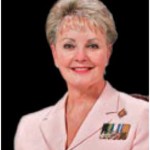
Lynda Haverstock was born on September 16, 1948 in Swift Current, Saskatchewan. From the University of Saskatchewan, Lynda obtained a Bachelor of Education, a Masters of Education, and received a PhD in clinical psychology. Lynda worked as a psychologist in private practice and also lectured for the University of Saskatchewan and the University of New Brunswick. Throughout her career as a psychologist, Lynda created many innovative programs for disabled students and truant adults. Lynda also focused on farm families in crisis and has written pieces for journals, books, and magazines, including a handbook entitled Fighting the Farm Crisis (1987) and the book entitled Safety and Health in Agriculture.
In 1989, Lynda was elected leader of the Liberal Party of Saskatchewan. She was the first woman to lead a Saskatchewan political party. In 1991, the support for the Liberal party more than doubled, but they failed to elect any MLAs other than Lynda, who won for Saskatoon-Greystone. Shortly after the 1995 provincial election, Lynda was forced out of being the leader for the Liberal party, but she remained in the Legislature for the remainder of the term as an independent. In 2000, Lynda was appointed 19th Lieutenant Governor of Saskatchewan by Prime Minister Jean Chretien. She held this position until 2006. During her tenure, Lynda held several events recognizing the work of volunteers, veterans, and service men and women.
In May of 2007, Lynda was appointed President and CEO of Tourism Saskatchewan. Lynda is a member of the National Strategy Council for the Mazankowski Alberta Heart Institute as well as the National Committee for the RCMP Heritage Center.
Throughout her career, Lynda has received many honours. In 1987, she received the Triple “E” Award of Excellence for her work as a psychologist. Lynda is a member of the Order of Canada and the Saskatchewan Order of Merit. Lynda has also received the Gzoski Award for contributions to literacy, the Paul Harris Fellowship for supporting the Rotary Foundation’s goal of world peace, and an honourary lifetime membership from the Army, Navy, and Air Force Veterans in Canada in recognition of her outstanding public service. From 2002 to 2005, Lynda was an honourary Colonel for 2 Canadian Forces Flying Training Schools in Moose Jaw. In 2007, Lynda received the Distinguished Canadian Award. Lynda has also received Honourary Doctorate degrees from the University of Saskatchewan, Royal Roads University in Victoria, and Queen’s University in Kingston, Ontario.
Lynda formerly resided at 1430 10th Street East and 1201 Elliott Street.
This information was gathered from the following sources:
– Henderson’s Saskatoon Directory, 1980-1985.
– Quiring, B. (n.d.). Haverstock, Lynda Maureen (1948-). In The Encyclopedia of
Saskatchewan. Retrieved from http://esask.uregina.ca/entry/haverstock_lynda_maureen_1948-.html
– Government of Saskatchewan (n.d.). Lynda Haverstock. Retrieved from
http://www.gov.sk.ca/adx/aspx/adxGetMedia.aspx?mediaId=571&PN=Shared
Helen Hughes
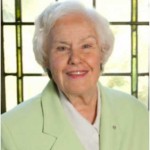
Helen Hughes was born in Vancouver, British Columbia. In 1950, she moved to Saskatoon when her father accepted a position as an Anglican priest. In 1954, Helen received a Bachelor of Science in Home Economics from the University of Saskatchewan. In the same year, she married Ted Hughes, a former Court of Queen’s Bench judge who made significant contributions to the Canadian judicial system.
In 1976, Helen joined Saskatoon City Council, where she focused on finances, planning and social service issues, as well as interests of people from First Nations communities. Helen fulfilled this position for 4 years. In 1980, she returned to British Columbia where she worked in the Ombudsman’s Office for 5 years. After that, she joined the B.C. Council of Human Rights. Helen received the Order of Canada in 1982 as a result of her work in building connections between urban Native and non-Native individuals.
Helen was elected to Victoria’s City Council in 1990 and fulfilled this position for 18 years, where she became known for her work in community service and youth programs, such as the Victoria Youth Empowerment Society. She was also a member of the Victoria Public Library Board and founded the Lifelong Learning Festival, which is held on International Literacy Day (September 8) every year.
Along with receiving the Order of Canada Award, Helen has received several other awards throughout her career. These include the Lifetime Achievement Award from Leadership Victoria as well as a Generosity of Spirit Award sponsored by the Victoria Foundation. In 2009, Helen received the Chancellor’s Community Recognition Award. Helen has also received Honourary Doctor of Laws degrees from the University of Saskatchewan and University Canada West.
Hughes Avenue in Dundonald is named in honour of Helen.
Helen formerly resided at 1410 13th Street East.
This information was gathered from the following sources:
– Duerkop, J. (2000). Saskatoon’s History in Street Names. Saskatoon: Purich Publishing
Ltd.
– Henderson’s Saskatoon Directory, 1958.
– Royal Roads University (n.d.). Helen Hughes. In Award Recipients. Retrieved from
http://www.royalroads.ca/news-events/convocation/awards/helen-hughes
Carlyle King
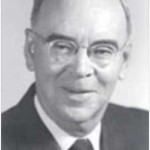
Carlyle King was born on November 25, 1907 in Cooksville, Ontario. He came to Saskatchewan in 1912 with his family. In 1926, he received a Bachelor of Arts degree with Honours in English and History from the University of Saskatchewan. From the University of Toronto, Carlyle received a Master of Arts Degree in 1927 and a PhD in 1931.
Carlyle’s political career began in 1939, when he was elected to the provincial executive of the Co-operative Commonwealth Federation (CCF). In 1940, he ran against George Williams for leadership of the party, but was defeated. However, he would become leader of the party in 1945 and remained in this position until 1960. Carlyle ran several election campaigns and wrote pamphlets for the CCF including “What is Democratic Socialism?”. Carlyle was also Chair of the Fellowship of Reconciliation, a major Pacifist organization.
In addition to being a politician, Carlyle was an accomplished academic and an important force in the arts and libraries of Saskatchewan. From 1947 until 1964, Carlyle was a member of the Saskatchewan Arts Board. From 1949 until 1964, Carlyle was also the Head of the English Department at the University of Saskatchewan. In 1955, he was president of the Saskatchewan Library Association. Carlyle was on the Board of the Saskatoon Arts Centre from 1957 until 1959. From 1958 until 1972, Carlyle was the Chair of the Saskatoon Public Library. Carlyle was Dean of Academic Services from 1967 until 1971 and Acting Vice-President of Academic Services in 1975.
Among the many awards Carlyle received was the Merit Award from the Canadian Library Trustees Association. In 1977, the Carlyle King Branch of the Saskatoon Public Library was named in his honour. From the University of Regina, Carlyle received an Honourary degree in 1984. He passed away on March 18, 1988.
Carlyle formerly resided at 1121 Temperance Street.
This information was gathered from the following sources:
– Henderson’s Saskatoon Directory, 1935.
– Kerr, D. (n.d.) King, Carlyle (1907-88). In The Encyclopedia of Saskatchewan. Retrieved
from http://esask.uregina.ca/entry/king_carlyle_1907-88.html
Andrew Leslie
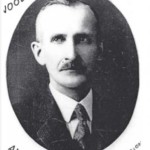
Andrew Leslie was born in 1889. When he came to Saskatoon from Londonderry, Ireland as a young man, he first entered onto the municipal payroll on April 1, 1909. On February 28, 1921 he was appointed City Commissioner. He served this position until he experienced a stroke in May of 1948, on the eve of a three-month leave of absence. Due to his unexpected illness, Andrew spent eleven months recovering in the hospital. From June 1 until September 1 of 1948, J.C. Oliver was appointed as Acting City Commissioner. Prior to Andrew’s return, the position of Acting City Commissioner was also filled by R.D. Phillips.
In May 1949, Andrew returned to his job as City Commissioner but was paid half salary. Harold Balfour was appointed Andrew’s successor on June 1, 1949. On September 27, 1949, City Council resolved to ask Andrew to retire from the position of City Commissioner. On September 29, 1949 he requested retirement on superannuation as of January 1, 1950. Andrew passed away on November 9, 1949.
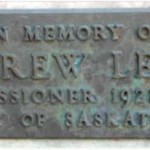
Andrew mostly gave financial advice to council and was an important contributor to the early municipal politics of Saskatoon. The Rainmaker statue in City Hall Square is dedicated to Andrew. A plaque underneath the statue remembers the former City Commissioner.
Andrew formerly resided at 1215 Elliott Street.
This information was gathered from the following sources:
– Henderson’s Saskatoon Directory, 1930.
– Saskatoon Star Phoenix “Andrew Leslie-Loyal Servant” November 10, 1949
– Saskatoon Star Phoenix “Leslie will Retire; Accepts Proposal From City Council” October 4, 1949.
– Saskatoon Star Phoenix “Council to Request Leslie to Resign” September 27, 1949.
– Saskatoon Star Phoenix “Long Rest for ‘Andy’” April 19. 1948
John Walter Grant MacEwan
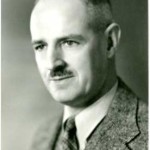
John Walter Grant MacEwan was born on August 12, 1902 on a farm near Brandon, Manitoba. He moved to Melfort, Saskatchewan with his family in 1915. From the Ontario Agricultural College in Guelph, John obtained a Bachelor of Science Degree. In 1926, John obtained a Bachelor of Science degree in Agriculture from the University of Toronto. In 1928, he obtained his Masters in Animal Science from the University of Iowa. In 1928, John began teaching Animal Science at the University of Saskatchewan. Aside from being a professor at the University of Saskatchewan, John also judged several livestock shows across Saskatchewan.
John was a best-selling author, having written over 55 pieces, including several university textbooks on animal husbandry and agriculture. In 1936, he began writing many pieces on agriculture and western Canadian history. In 1948, John moved to Manitoba and became the Dean of Agriculture and Home Economics at the University of Manitoba. In 1952, John returned to Saskatchewan for a few months to be an agriculture editor of the Western Producer.
From 1953 until 1958, John was a Calgary Alderman. In 1955, he was elected to the Legislative Assembly for the electoral district of Calgary. He served as the Mayor of Calgary from 1963 until 1965. On January 6, 1966, John was appointed Lieutenant Governor of Alberta by Prime Minister Lester B. Pearson. John fulfilled this position until 1974. In 1976, John was appointed to the Board of Directors of the Alberta Historical Resources Foundation and served as Chairman of the Board in 1978.
John has received many honours throughout his career. He received Honourary Doctor of Laws degrees from the University of Alberta in 1966, the University of Calgary in 1967, the University of Brandon in 1969, the University of Guelph in 1972, and the University of Saskatchewan in 1974. He was awarded the Order of Canada in 1975. In 1985, John received the Governor General’s Conservation Award and was the first person to receive the Premier’s Award for Excellence. John passed away on June 15, 2000 in Calgary.
John formerly resided at 313 Bottomley Avenue North.
This information was gathered from the following sources:
– Henderson’s Saskatoon Directory, 1940.
– Legislative Assembly of Alberta (n.d.). The Honourable J.W. Grant MacEwan, 1966-74.
Retrieved from https://www.assembly.ab.ca/lao/library/lt-gov/macewan.htm
– Ralko, J. (n.d.). MacEwan, Grant (1902-2000). In The Encyclopedia of Saskatchewan. Retrieved from http://esask.uregina.ca/entry/macewan_grant_1902-2000.html
Hugh Edwin Munroe
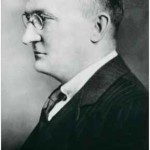
Hugh Edwin Munroe was born on June 16, 1878 in Glengarry, Ontario. Hugh received a Medical degree from McGill University and did post-graduate training in Edinburgh. Hugh moved to Saskatoon where he began practicing medicine in 1904.
After travelling overseas, Hugh returned to Saskatoon in 1905 and entered into municipal politics. Hugh was a member of the first City Council as well as Chairman of the City Hospital Board from 1905 until 1914. In 1931, Hugh became the fifth Lieutenant Governor of Saskatchewan. He fulfilled this position until 1936. In 1936, Hugh was the King’s representative in Saskatchewan. During World War I, Hugh earned the rank of Lieutenant Colonel and was awarded the Most Excellent Order of the British Empire for his service. When he returned to Saskatoon, he resumed his medical practice and political activity. Hugh passed away on March 12, 1947 in Florida.
Munroe Avenue is named in his honour.
This information was gathered from the following sources:
– Jackson, M. (n.d). Lieutenant-Governor. In The Encyclopedia of Saskatchewan.
Retrieved from http://esask.uregina.ca/entry/lieutenant-governor.html
– Stoffel, H. (n.d.). Munroe, Hugh Edwin (1878-1947). In The Encyclopedia of
Saskatchewan. Retrieved from http://esask.uregina.ca/entry/munroe_hugh_edwin_1878-1947.html